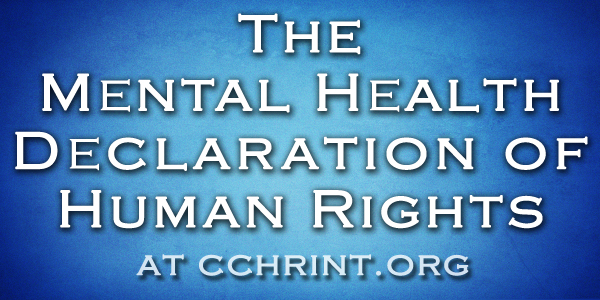Mental Health Week—Watchdog Calls For Increasing Patient Rights, Not Pharmaceutical Marketing
By Kelly Patricia O’Meara
October 8, 2014
This week the psychiatric/pharmaceutical industry is busy promoting “Mental Illness Awareness Week,” a campaign launched by the heavily pharmaceutically-funded “patient’s rights organization,” the National Alliance on Mental Illness (NAMI), promoting the “benefits of early intervention and treatment,” and ignoring, once again, the real crisis in today’s mental health—the millions of men, women and children being prescribed psychiatric drugs that hundreds of international drug regulatory agencies cite as dangerous and life-threatening.
The Citizens Commission on Human Rights (CCHR), an international mental health watchdog responsible for helping to enact more than 150 worldwide reforms, argues that instead of more drugs and more thinly veiled pharmaceutical marketing campaigns, such as NAMI’s campaign to “End the Stigma of Mental Illness,” real mental health awareness should focus on the damage being inflicted upon millions under the guise of mental health, and that real change will only come with patient protections; namely, a mental health declaration of human rights to protect millions from abuse at the hands of the mental health industry.
The data is startling and, today, mental illness diagnosis and “treatment” has resulted in:
- 183 million people are taking at least one psychiatric drug worldwide.
- 20 million children worldwide—including 1 million 0-5 year olds in the U.S. alone—are taking psychiatric drugs.
- 90,000 Emergency Room visits in the U.S. per year are due to psychiatric drugs.
- 22,780 birth defects in the U.S. each year are attributed to psychiatric drugs.
- 23,755 suicides in the U.S. each year are attributed to psychiatric drugs.
- 61,000 deaths are attributed to psychiatric drugs each year in the U.S.
- There are 37 drug regulatory agency warnings from eight countries and the European Union on antidepressants causing suicide, suicide risk and attempts.
- According to the CDC, prescription drug abuse is the fastest growing drug problem in the U.S.
- 15,000 of the nation’s elderly die annually from antipsychotic drugs.
- There are 22 international drug regulatory warnings on psychiatric drugs, citing effects of mania, hostility, violence and homicidal ideation.
- 63,000 people—one every forty seconds—are committed every month, against their will, to a psychiatric facility.
- An estimated 1 million people worldwide are subjected to ECT each year.
- Chinese and Russian authorities continue to forcibly commit political dissidents to psychiatric institutions—a practice that has been widely condemned by human rights groups and the United Nations.
Given that a U.S. Senate investigation revealed that in just two years pharmaceuticals funded NAMI to the tune of $23 million, representing about three-quarters of its donations, it is no surprise that they chose to ignore the current crisis in mental health and focus on increasing treatment, rather than protecting patients from harm. Even NAMI’s campaign to stop the “stigma” and “end discrimination” against mental illness had as its “Founding Sponsors,” Abbott Labs, Bristol-Myers Squibb, Eli Lilly, Janssen, Pfizer, Novartis, SmithKline Beecham and Wyeth-Ayerst Labs—the pharmaceutical giants that greatly benefit from the ‘early intervention and treatment’ NAMI is promoting.
CCHR says that the psychiatric abuses and human rights violations occurring around the world are not due to a lack of mental health awareness, but rather to organizations more aligned with vested interests than patients rights and that real mental health awareness would come from enacting an international set of protections from an invasive, intrusive and abusive mental health industry, and CCHR is calling for the adoption of its Mental Health Declaration of Human Rights.
Among these rights are:
- The right to full-informed consent, including:
- The scientific/medical test confirming any alleged diagnoses of psychiatric disorder and the right to refute any psychiatric diagnoses of mental “illness” that cannot be medically confirmed.
- Full disclosure of all documented risks of any proposed drug or mental “treatment.”
- The right to be informed of all available medical treatments which do not involve the administration of a psychiatric drug or treatment.
- The right to refuse psychiatric drugs documented by international drug regulatory agencies to be harmful and potentially lethal.
- The right to refuse to undergo electroshock or psycho-surgery.
- That no person shall be forced to undergo any psychiatric or psychological treatment against his or her will.
- That no man, woman or child, may be denied his or her personal liberty by reason of mental illness, without a fair jury trial by laymen and with proper legal representation.
- That no person shall be admitted to or held in a psychiatric institution, hospital or facility because of their political, religious or cultural or social beliefs and practices.
The need for global acceptance of the Mental Health Declaration of Human Rights is made clear when CCHR explains that, “virtually no human or civil rights are granted to those psychiatry deems mentally ill, that no medical or scientific tests exist to conclusively prove anyone is mentally ill, and that no guidelines exist to protect citizens from abuses committed under the guise of mental health.”
Mental Illness “Awareness“ is realizing that without such a declaration, abuses in psychiatric diagnosing and drugging will continue without restraint. Read the entire Mental Health Declaration of Human Rights here.
–
Kelly Patricia O’Meara is an award-winning former investigative reporter for the Washington Times’ Insight Magazine, penning dozens of articles exposing the fraud of psychiatric diagnosis and the dangers of the psychiatric drugs—including her ground-breaking 1999 cover story, “Guns & Doses,” exposing the link between psychiatric drugs and acts of senseless violence. She is also the author of the highly acclaimed book, Psyched Out: How Psychiatry Sells Mental Illness and Pushes Pills that Kill. Prior to working as an investigative journalist, O’Meara spent sixteen years on Capitol Hill as a congressional staffer to four Members of Congress. She holds a B.S. in Political Science from the University of Maryland.




SHARE YOUR STORY/COMMENT